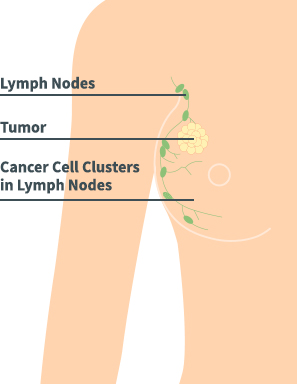About The Condition
 Breast cancer refers to cancer that forms in the breast cells. Hearing that you have breast cancer can be a frightening experience, but breast cancer today has a high rate of survivorship. One way to reduce your fear and anxiety is to learn about the condition and your treatment options, and to become engaged in the decision making process with your health care team. The following information is designed to help you make surgical choices as the first step in your treatment plan.
Breast cancer refers to cancer that forms in the breast cells. Hearing that you have breast cancer can be a frightening experience, but breast cancer today has a high rate of survivorship. One way to reduce your fear and anxiety is to learn about the condition and your treatment options, and to become engaged in the decision making process with your health care team. The following information is designed to help you make surgical choices as the first step in your treatment plan.
The most common types of breast cancer are:
- Ductal Carcinoma in Situ (DCIS): This is a non-invasive cancer that stays inside the milk duct.
- Lobular Carcinoma in Situ (LCIS): This is an overgrowth of cells that stay inside the lobule. LCIS is not actually cancer, but it is a high-risk feature.
- Invasive Ductal Carcinoma (IDC): The most common type of breast cancer is invasive ductal carcinoma. It begins in the milk duct but grows into the surrounding normal tissue inside the breast and sometimes into the axillary lymph nodes.
Before Surgery
 Physicians will stage your cancer before your surgery and again after surgery to guide your treatment plan.
Physicians will stage your cancer before your surgery and again after surgery to guide your treatment plan.
Clinical staging estimates the extent of your cancer based on results of a physical exam, imaging tests and tumor biopsy. For some cancers, blood tests may also be used in clinical staging.
Pathologic staging happens after surgery, when a pathologist reviews the tumor. This information provides your health care team with more precise information to guide treatment. If you have invasive cancer (stage 1 or 2), your surgeon will remove your sentinel lymph node during surgery to see if the cancer has spread. The sentinel lymph nodes is the first lymph node to receive lymphatic drainage from a tumor and thus is the first lymph node to show cancer that has spread
Surgery
There are two primary types of surgery for patients with breast cancer.
Lumpectomy, also called breast conserving surgery, removes the tumor and some normal surrounding tissue, keeping the breast intact. The normal tissue that is removed will be sent to pathology during surgery to ensure that all cancer cells have been removed. Sometimes, a second surgery is needed to remove additional tissue. A lumpectomy is almost always followed by radiation treatments unless you are 70 years or older.
Mastectomy, also called a simple or total mastectomy, refers to the removal of the entire breast. You may choose to have one or both breasts removed during this procedure, depending on your diagnosis, the size and location of the cancer cells and your risk of developing additional cancer. Removal of both breasts is called a bilateral or double mastectomy. When axillary lymph nodes under the arm are also removed, the procedure is called a modified radical mastectomy. Reconstruction surgery to rebuild the breast is done during the initial surgery and may require additional surgeries in the future.
After Surgery
Lumpectomy. Your surgery will be a same-day procedure, and you will go home with a small ice pack to keep on your breast to keep the swelling down. You should be able to go back to work the next day, but you should refrain from lifting objects weighing more than __ pounds for a couple of weeks.
Recovery from a lumpectomy is usually very fast. You may have some slight discomfort for a few days, especially if you bump your breast, but in most cases it can be handled with over-the-counter ibuprofen or acetaminophen. If you notice drainage from your incision, the pain becomes worse or you start to run a temperature, call your physician, as this may signal an infection.
Mastectomy. Mastectomy is major surgery, so you will remain in the hospital at least overnight. When you go home, you will have drainage tubes to drain as they fill up with fluids from your incisions.
Recovery from a mastectomy takes a couple of weeks. You will be sent home from the hospital with pain medication and will need to return to your surgeon in a few days to have your bandages changed. If you are having reconstruction surgery, your physician will let you know when the surgical site is healed enough for additional surgery.


